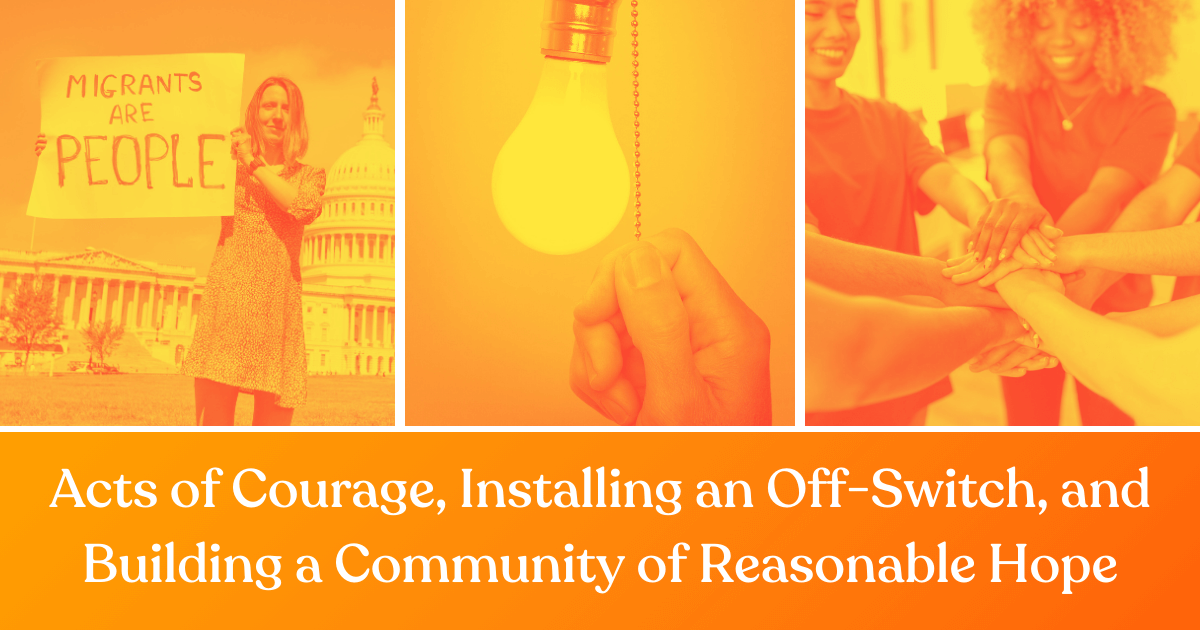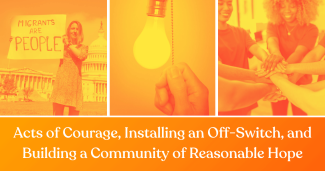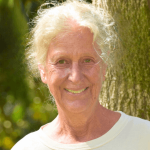Acts of Courage, Installing an Off-Switch, and Building a Community of Reasonable Hope: Practical Actions for Health Advocates

[Editor’s Note: Here on our blog, MCN’s Director of Witness to Witness, Kaethe Weingarten, PhD, shares stories, resources, and helpful tips to support health care workers and others through the stressors they encounter as they care for the most vulnerable in our communities. This week has been difficult for clinicians and their patients; in this blog, Dr. Weingarten hopes to “re-moralize” our clinical network so we can continue to do the important work of serving the health and well-being of migrants and immigrants.]
In the face of an onslaught of new executive orders that stigmatize and dehumanize categories of people, who are scared and anxious as a result, one person’s bold act of courage stood out. The Bishop of the Episcopal Diocese of Washington, Bishop Mariann Edgar Budde, a 65-year-old married woman, directly appealed to President Trump during the inaugural prayer service on January 21, asking him to have mercy on “gay, lesbian, and transgender children in Democratic, Republican, and Independent families, some who fear for their lives.” She went on to mention another group who live in fear: “The vast majority of immigrants are not criminals…I ask you to have mercy, Mr. President, on those in our communities whose children fear that their parents will be taken away, and that you help those who are fleeing war zones and persecution in their own lands to find compassion and welcome here.”
Later, in an interview, Bishop Budde indicated that she wasn’t specifically directing her comments at the President but at the impact of his executive orders, such that people had a “license” to be “quite cruel.” She went on. “I was trying to say, ‘The country has been entrusted to you,’…And one of the qualities of a leader is mercy, right? Mercy. And to be mindful of the people who are scared.” The same day that the Bishop spoke out, the administration rescinded an order that has been in place since 2011 that prohibits Immigration and Customs Enforcement (ICE) agents from entering places of worship, hospitals, and schools, which had been marked as “sensitive locations.” Many worry that people lacking adequate documents will no longer visit these places or allow their children to do so.
I wrote about being an upstander in my December blog, “Confronting Immoral Actions, We Can Aim to Stand Up, Not Look On.” Yesterday, Bishop Budde was an upstander. Pope Francis, another upstander, called plans for mass deportation “a disgrace.” Leaders of human rights organizations have spoken about the dire consequences of the orders for trans people, who have been rendered “non-existent,” by the new categories established by the recent executive orders. Leaders of national immigration organizations have spoken out and our Migrant Clinicians Network CEO, Kim Nolte, has written eloquently about the need to acknowledge the contributions of immigrants who “serve this country in a myriad of ways, from building our houses to putting food on our tables, to caring for us in hospitals.”
Why do acts of courage matter and why is it important to notice and appreciate them? In my short essay on reasonable hope, I assert that hope is a feeling that in times of upheaval can be very hard to summon. Reasonable hope is a practice that people do together. What I cannot feel myself, I may be able to feel if I stand with others. In that essay I write that looking for courage is an action that supports doing reasonable hope. We can “notice, reach out and support the whistle blowers, the risk takers, the brave so that they do not stay out on a limb, but instead are joined there, like birds on a telephone wire.” We may not be the people who make a public statement, but we can talk with our friends and colleagues about those statements when we hear about them. We can circulate stories of courage. Doing so inspires reasonable hope.
Much is going sideways these days; not going as we had hoped it would. Feeling discouraged about this is understandable. At the Witness to Witness Program, we make the point that doing something big is not the only way to take action in support of what we value. Small actions are not the same as trivial ones. Expressing appreciation for the work others do is an action. It uplifts people. Showing kindness to a stranger while waiting in a line is a small action that matters. Many people are not ready to add activism to the work they are already doing; their work is activism enough!
For those who are choosing activism, Loretta Ross, an academic and social justice activist, has good advice for how to sustain activism. She is clear that a diet solely of activism will wear a person out. She cautions people to balance their political work with non-political activities and friendships. She writes that if you are going to work hard for your cause, “party as hard as you work.” I take inspiration from Ross’ work.
I wrote out some suggestions for myself based on hers. I want to remember that activism and attention to the work that needs to be done should have an off switch. When I am doing activism work, I want to do it wholeheartedly with others. But when I am not specifically doing activism, I want to turn it off. While I am not sure the metaphor of “balance” is helpful to me – juggling may be more appropriate, and some balls are likely to fall to the ground and I will have to pick them up – I do want to be sure I have plenty of enjoyable activities to leaven the distress I am sure to feel a lot of the time.
How do I do that? Here are some of the activities I am doing with a lot of intentionality. I am noticing beauty. There is a camelia tree coming into bloom outside my window. I look at it and think about the good fortune that in January I can see a tree in bloom. I have a book of poems that has to do with gardening, but are about so much more. That book is strategically placed near my computer now and I open it randomly at least once a day and slowly read a poem. I am also watching re-runs of my favorite baking show.
Last night, I called and left a message* for Bishop Budde. There was a catch in my voice when I did so and maybe she will hear that her courage made a difference to someone who lives 3000 miles away. If you want, let me know what you are doing to sustain reasonable hope. You can reach me at kweingarten@migrantclincian.org. We can be birds together on that telephone wire.
* We can express our gratitude by phone: 202-537-6200 or by email: info@cathedral.org.
- Log in to post comments

